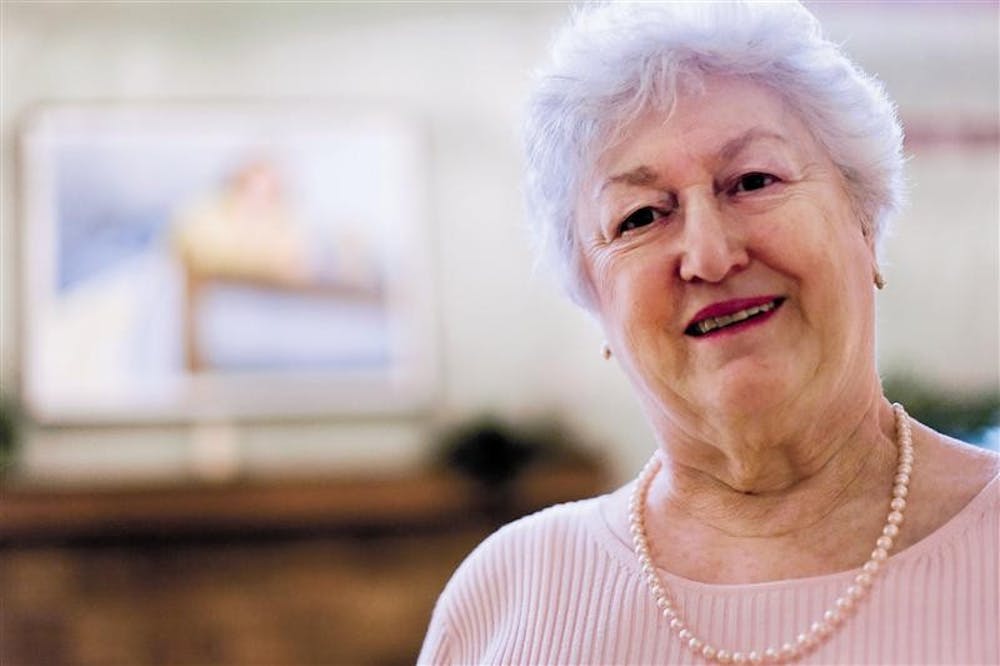Early October sunlight streams through the large kitchen windows in the back of a cream-colored house, framing the sea of red and orange leaves brushing the cloudless sky.
In the kitchen, five men sit on either side of a long table. One skims the daily paper while two others sip coffee to ease their tired eyes.
Even in the early morning, their senses of humor endure as they take turns cracking jokes. The occasional interruptions in conversation are met with appreciative chuckles, the loudest laugh of all coming from whomever made the latest wisecrack. The grins spreading across their seasoned faces do not reveal the battle for life taking place inside each of these men.
“How are we doing this morning?” Peg Howard asks as she walks through the kitchen in her soft pink sweater.
“Well, I’m on the grateful-I’m-not-dead tour,” teases one of the guests, referencing the old rock band.
Unshaken by the dry humor, she smiles at the other guests and retorts, “See what I have to put up with?”
Peg, alongside her husband Bud, founded Jill’s House, a temporary residence for cancer patients who are receiving treatment at the Midwest Proton Radiotherapy Institute in Bloomington.
The couple opened the house as a way to honor their son who lost his life to cancer at a young age and IU student Jill Behrman. The house was named for Behrman – who was abducted and killed in 2000 – with the hope that it would help others who were suffering. Both Howard and her husband now work at the house five days a week, maintaining the facility and caring for its guests.
“Our first priority is to see that the guests are comfortable,” Peg said. “Then we need to see that the house is operating efficiently.”
Her schedule changes daily, but it’s always full. She balances paperwork, meetings, public speaking opportunities and special events.
LIFE AND LOSS
Peg and Bud met in high school and started dating when she turned 16. After several years, they married and had six children. Their summer house on Lake Lemon was a retreat where the kids could boat and waterski. It was during these happy times that the family created tight bonds that would be tested in the coming years.
Nobody suspected that Steve Howard, a young and energetic high school student, was fighting a cancer spreading inside of him.
“He walked into the hospital and looked perfectly well, athletic, healthy,” Peg said.
He left the hospital, however, with an amputated leg. The doctors hoped this would stop the cancer, osteo-sarcoma in his right femur, from spreading. The amputation made it impossible to conceal Steve’s struggle with the disease from the younger members of the family.
“It caused us to be perfectly honest,” Peg said.
The family had a meeting to explain what was happening to Steve and the importance of sticking together as a family.
When the cancer spread to Steve’s lungs, though, his doctor suggested he be taken to New York for better medical care. Peg accompanied Steve to the East Coast, while his younger sister helped their dad care for the other children.
Peg stayed in a hotel with her son for six weeks while she supported him through treatment. His greatest concern wasn’t his own health, though; it was that his mom was alone in New York. Steve always seemed to be thinking more about others than himself.
“He was only 19 and just wanted to know what he could do with his life, just wanted to make a difference,” Peg said with watery eyes.
Steve died a short time later, but only after graduating from high school and spending his summer on the lake as always. He even went waterskiing on one leg.
While Steve worried that his potential in life might never be realized, Peg recalls a preacher telling him, “You have done more with your life than most people who live to be 90.”
Peg remembers visiting the cemetery to place a wreath over Steve’s grave. She was surprised to find one already resting there when she arrived. She later discovered that the wreath was a gift from a group of young people Steve had known in high school. While classmates pressured Steve to do drugs, he always refused, ultimately catalyzing their efforts to become clean.
“What problems do you have that are so great you need to use drugs?” Peg recalls Steve asking his classmates. “I face death every day of my life, and every day is a gift from God.”
A few years later, every one of them had kicked the habit. They left the wreath as a way to thank the young man who had altered their lives.
IN LOVING MEMORY
Steve’s chance to experience life was cut all too short, but his influence on this world wasn’t. Jill’s House was created to celebrate his life and encourage others experiencing the same struggles.
“We feel like we built this house because of our son.” Peg said. “It is so important for us to leave something for him.”
Guests come from all over the Midwest and from as far as California to receive treatment at MPRI. Instead of paying an average hotel cost of $100 a night, guests stay at the house for a third of that cost. Nobody is turned down for inability to pay.
Private rooms and socialization areas are important features of Jill’s House. Peg’s attempt to create a source of camaraderie and a place to feel like home stemmed from her own experience with being away from her family during Steve’s treatment.
“I know how difficult it is not to have somewhere to stay, to be living in hotel rooms with no support at a time when you are the most frightened you can possible be,” Peg said.
The guests bond quickly, going out to dinner or shopping together and keeping a ritual of renting movies as a group on Wednesday nights. They frequently hold pitch-in dinners to cook meals together. Peg described them as “a rowdy bunch.”
Peg believes the first priority at Jill’s House is caring for the guests in all aspects of their lives.
“I always say, when you are going through a crisis, the three F’s apply,” Peg said. “You need your faith. You need your family. And you need your friends.”
Daily hugs and thank-yous assure Peg that her efforts are truly appreciated.
One guest commented, “This establishment takes something that could be scary and lonely and turns it into something fun and exciting.”
Despite all they are enduring physically, Peg said guests enjoy the time they spend at Jill’s House. Peg has a hard time saying goodbye to guests, and they have a difficult time leaving.
“Once they’re here,” she said, “they don’t want to leave.”
Humor and happiness in a temporary home

Get stories like this in your inbox
Subscribe





